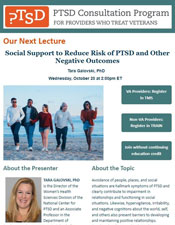PTSD: National Center for PTSD
PTSD Consultation Program Newsletter
PTSD Consultation Program Newsletter

The PTSD Consultation Program Newsletter is a monthly electronic publication for health care providers who treat Veterans. It is created and distributed by the National Center for PTSD, Department of Veterans Affairs. Each issue describes the upcoming webinar in the PTSD Consultation Program Monthly Lecture Series and includes registration links for free continuing education. It also includes a PTSD-focused article written for providers with links to a variety of free resources to help with treatment delivery, such as patient-education videos and pamphlets.
Every issue also includes a link to the PTSD Consultation Program where any provider treating Veterans in any context can ask a question of our team of experts. We follow up with free consultation about diagnosis, assessment, treatment, medications, common comorbidities, program referral and more.
Sign Up
Enter your email address below to subscribe to the monthly PTSD Consultation Program Newsletter. View our other electronic publications on the Subscribe page.
- December:
- Addressing Religious or Spiritual Dimensions of Trauma and PTSD (article)
- Brief videos for patients and prescribing for PTSD (resources)
- November:
- Complex PTSD (article)
- Holiday stress and Mindfulness Coach (resources)
- October:
- Working with People Affected by Disaster Events (article)
- Disaster response and safety plan app (resources)
- September:
- o Sleep Problems in Veterans with PTSD (article)
- o Webinar addressing clinician negative reactions to patients' sociocultural (resources)
- August:
- PTSD and Physical Health (article)
- Tobacco cessation (resources)
- July:
- PTSD Screening and Referral: For Health Care Providers (article)
- Assessment tools and CAPS-5 training (resources)
- June: No newsletter published
- May:
- Moral Injury (article)
- PTSD Repository and PTSD Awareness Month (resources)
- April:
- Psychedelics-Assisted Therapy for PTSD (article)
- Treatment engagement and shared decision-making (resources)
- March:
- PTSD Screening and Referral: For Health Care Providers (article)
- Provider Self-Care Toolkit and PTSDpubs publications database (resources)
- February:
- Eye Movement Desensitization and Reprocessing for PTSD (article)
- EMDR client and family education and 2023 CPG tools (resources)
- January:
- Cannabis Use and PTSD Among Veterans (article)
- Community provider training and racial stress and trauma (resources)
- December:
- PTSD and End of Life: Clinical Considerations for PTSD in Palliative or Hospice (article)
- New posters and moral injury scale (resources)
- November:
- Provider Guide to Addressing Veterans' Reactions to Large-Scale Traumatic Events (article)
- New Safety Plan mobile app and online courses (resources)
- October:
- Cognitive Processing Therapy for PTSD (article)
- CPT education for patients, families, and providers (resources)
- September:
- Complementary and Integrative Health (CIH) for PTSD (article)
- Mindfulness Coach mobile app and updated Clinical Practice Guideline (resources)
- August:
- Prolonged Exposure for PTSD (article)
- PTSD Awareness in Health Care Settings (resources)
- July:
- Chronic Pain and PTSD (article)
- AboutFace and online course for family members (resources)
- June:
- PTSD and End of Life: Clinical Considerations for PTSD in Palliative or Hospice Care (article)
- New Clinical Practice Guideline & PTSD Awareness Month (resources)
- May:
- Addressing the Stress and Trauma of Experiencing Intimate Partner Violence (article)
- Mobile app demonstration videos (resources)
- April:
- FAQs about PTSD Assessment (article)
- Preparing for PTSD Awareness Month (resources)
- March:
- PTSD and the Family (article)
- Trauma-informed care and assessment training (resources)
- February:
- The relationship between PTSD and suicide (article)
- Responding to mass violence and race-based violence (resources)
- January:
- Traumatic brain injury and PTSD (article)
- Community provider training and recorded lectures (resources)
- December:
- Veterans with PTSD in the justice system (article)
- Veterans Justice Outreach Program and responding to mass violence (resources)
- November:
- The experience of chronic pain and PTSD: A guide for health care providers (article)
- PTSDpubs database and PTSD Bytes podcast (resources)
- October:
- Grief: Different reactions and timelines in the aftermath of loss (article)
- Grief and disaster response (resources)
- September:
- Provider guide to addressing patient reactions to race-based violence during PTSD treatment (article)
- Racial trauma materials and PTSD treatment whiteboard videos (resources)
- August:
- Cannabis use and PTSD among Veterans (article)
- Continuing education options (resources)
- July:
- Providing mental health care for those who experienced military sexual trauma (article)
- MST patient-education materials (resources)
- June:
- Using the PTSD Treatment Decision Aid with your patients (article)
- PTSD Screening Day & LGBTQ+ pages (resources)
- May:
- Eye Movement Desensitization and Reprocessing (EMDR) for PTSD (article)
- Patient education for EMDR (resources)
- April:
- PTSD screening and referral for VA care (article)
- New CPT Coach mobile app (resource)
- March:
- AboutFace: Veteran video stories and their use in PTSD treatment (article)
- Other online tools for use in PTSD treatment (resources)
- February:
- How PTSD affects the family and the role of family members in treatment (article)
- Helping a loved one with PTSD (resources)
- January:
- Managing provider self-care during COVID-19 (article)
- AboutFace and COVID Coach mobile apps (resources)
- December:
- Sleep problems in Veterans with PTSD and cultural considerations during treatment (article)
- Patient education and mobile apps related to sleep (resources)
- November:
- New pharmacotherapy developments for PTSD (article)
- Patient education videos, mobile apps and downloads (resources)
- October:
- Cannabis use among Veterans (article)
- Stress First Aid for health care workers (resource)
- September:
- Addressing Veterans' reactions to Afghanistan events (article)
- Online article and blog for Veterans coping with events in Afghanistan (resources)























